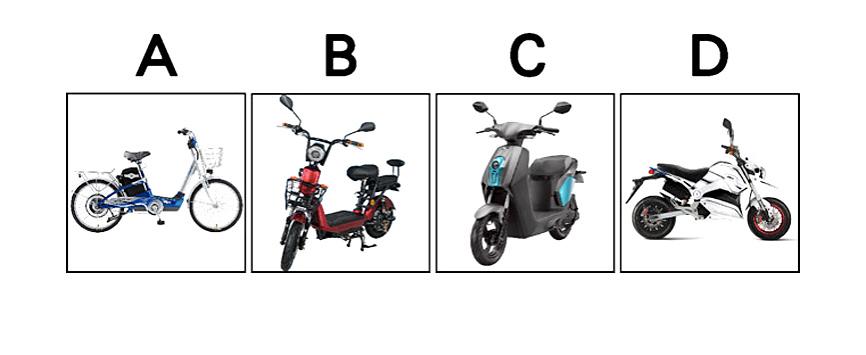The government should crack down on illegal electric bicycles and scooters, the non-profit Consumers’ Foundation said on Friday, citing research on the potentially dangerous speed of the vehicles.
Electric bicycles and lightweight electric scooters have gained popularity as they do not require registration and riders do not need licenses, the foundation said, adding that as many as 40 percent of them can reach speeds exceeding the legal limit of 25kph for non-licensed two-wheelers.
Some consumers also purchased legal electric vehicles and modified them to reach higher speeds, it said.

Photo provided by the Consumers’ Foundation
“If the government does not step up efforts to confiscate these illegal electric vehicles, they could become a danger to consumers’ personal safety,” the foundation said.
In a spot check last month of 12 vehicles sold on auction Web sites and online retail platforms, the foundation found that five of the vehicles reached speeds exceeding the legal limit, it said.
Two of them reached 60kph, similar to fuel-powered motorcycles with engines between 50cc and 250cc that require white license plates, it said.
The foundation also found numerous video tutorials and online articles on the modification of electric bicycles, for example to remove factory-installed speed limiters, it said, adding that a traffic accident with a modified vehicle might be fatal.
Under stipulations of the Road Traffic Management and Penalty Act (道路交通管理處罰條例), people who exceed the 25kph speed limit can be fined between NT$900 and NT$1,800.
The number of accidents involving electric bicycles and lightweight electric scooters in 2018 almost doubled from 2014, but police were still at odds over how to handle traffic violations involving the vehicles, which occupy a “fuzzy space” between bicycle regulations and regulations for heavier two-wheelers.
However, as the vehicles pose an alternative for those without a license or those who are attracted by their low cost — such as elderly people, young people and migrant workers — there is a pressing need for the introduction of clear regulations, the foundation said.
For example, the government could introduce insurance or license requirements that include a written test, as known from regular motorcycle license tests, it said.
This would ensure that riders are familiar with traffic rules, the foundation said, adding that the government must also hold retailers accountable for informing people about the dangers posed by the vehicles, especially if modified, and the importance of sticking to the traffic rules.

Taiwanese can file complaints with the Tourism Administration to report travel agencies if their activities caused termination of a person’s citizenship, Mainland Affairs Council Minister Chiu Chui-cheng (邱垂正) said yesterday, after a podcaster highlighted a case in which a person’s citizenship was canceled for receiving a single-use Chinese passport to enter Russia. The council is aware of incidents in which people who signed up through Chinese travel agencies for tours of Russia were told they could obtain Russian visas and fast-track border clearance, Chiu told reporters on the sidelines of an event in Taipei. However, the travel agencies actually applied

Japanese footwear brand Onitsuka Tiger today issued a public apology and said it has suspended an employee amid allegations that the staff member discriminated against a Vietnamese customer at its Taipei 101 store. Posting on the social media platform Threads yesterday, a user said that an employee at the store said that “those shoes are very expensive” when her friend, who is a migrant worker from Vietnam, asked for assistance. The employee then ignored her until she asked again, to which she replied: "We don't have a size 37." The post had amassed nearly 26,000 likes and 916 comments as of this

US President Donald Trump said "it’s up to" Chinese President Xi Jinping (習近平) what China does on Taiwan, but that he would be "very unhappy" with a change in the "status quo," the New York Times said in an interview published yesterday. Xi "considers it to be a part of China, and that’s up to him what he’s going to be doing," Trump told the newspaper on Wednesday. "But I’ve expressed to him that I would be very unhappy if he did that, and I don’t think he’ll do that," he added. "I hope he doesn’t do that." Trump made the comments in

Tourism in Kenting fell to a historic low for the second consecutive year last year, impacting hotels and other local businesses that rely on a steady stream of domestic tourists, the latest data showed. A total of 2.139 million tourists visited Kenting last year, down slightly from 2.14 million in 2024, the data showed. The number of tourists who visited the national park on the Hengchun Peninsula peaked in 2015 at 8.37 million people. That number has been below 2.2 million for two years, although there was a spike in October last year due to multiple long weekends. The occupancy rate for hotels